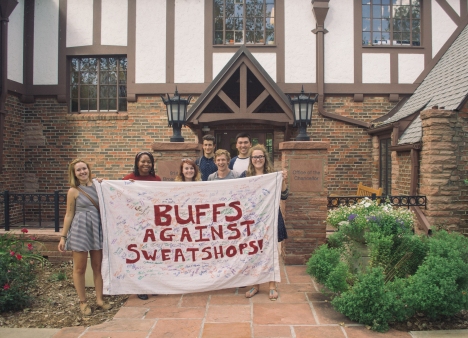by Dave Anderson

USAS Activists at UC Boulder
A university should be a critic and conscience of society, according
to an old-fashioned view. There are lofty goals on campus plaques and
universities should certainly provide a unique space for dissident
views.
Nevertheless, if you scratch the surface, you realize that
universities are increasingly knowledge factories subordinate to
corporate America.
Progressive student activists challenge universities to live up to
their ideals. United Students Against Sweatshops (USAS) is a
nationwide, grassroots group organizing solidarity with workers who
face grievous conditions locally and abroad.
They have focused their activism on the reckless business practices of
university-branded sports apparel brands. As students attending
colleges and universities with multimillion-dollar apparel programs,
USAS has conducted campaigns to force apparel brands like Nike to
respect workers rights. University of Colorado has a huge contract
with Nike.
On April 5, the CU Boulder chapter of USAS hosted a talk by Noi
Supalai, former union president and Nike factory worker from Thailand.
She described her struggles while working for a sub-contracting
company in Thailand called Eagle Speed, which produced clothing for
brands such as Nike, Northface, Columbia and Puma.
Accompanied by a volunteer translator, Supalai explained that after
the 2008 world economic meltdown, these brands began to order less
clothing from Eagle Speed.
Supalai said that, “it was at that point that Nike took advantage of
the situation and made a deal with the factory trying to order in
higher quantity, and they pressured for greatest quality, and we had
to produce it within a shorter time frame and in lower costs.”
Supalai said that Nike threatened to terminate Eagle Speed’s contract
if they didn’t agree to the new conditions. The 2,000 Eagle Speed
workers were unable to keep up with the high demand. As a result, Nike
placed a fine on the factory and refused to pay for any of the
clothing produced.
The workday was elongated from 8 a.m. to midnight or 1 a.m. Management
placed devices on their bodies to track their working pace to ensure
consistency. The workers didn’t get paid for two months and couldn’t
even go home.
In desperation, the workers went on strike. When Supalai and 24 of her
fellow co-workers attempted to meet with Eagle Speed management, they
were directed to a room where they were immediately locked up.
She said Eagle Speed’s response when questioned about the detention
was, “You are too radical, stirring up workers.”
The Eagle Speed workers contacted the Thai government’s Department of
Labor Protection who refused to help them. The workers directly
contacted Nike and got the run-around.
Finally, they reached out to the Workers Rights Consortium (WRC), an
independent labor rights monitoring organization.
Within one week, the WRC was able to reach an arrangement with Eagle
Speed that successfully allowed former workers to go back to work with
a promise that they wouldn’t be discriminated against and that those
who wished to resign would be granted full compensation.
The WRC attempts to combat sweatshops around the globe and protect the
rights of workers who make apparel and other products. It was founded
in 2000 by university administrators, labor rights experts and student
activists. The group’s primary focus is the labor practices of
factories that make university-related apparel.
The WRC conducts independent, in-depth investigations; issues public
reports on factories producing for major brands; and aids workers at
these factories in their efforts to end labor abuses and defend their
workplace rights.
Nearly 200 schools are WRC affiliates. CU is one of them. For many
years, WRC and Nike have had a reasonably cooperative relationship.
However, the situation changed recently. Late last year, workers at a
Nike supplier’s factory in Vietnam held a pair of strikes over working
conditions. The WRC wanted to inspect the factory but Nike stopped
them.
WRC director Scott Nova was “surprised and concerned” by this change.
He said, “What it boils down to is Nike prefers not to be accountable
to an independent investigative body. They want to police the working
conditions themselves. The reason there are mandatory standards is
it’s not prudent to allow companies to police themselves.”
Nike has a lengthy history dealing with labor watchdogs and student
activists. In the 1990s, the company was embarrassed over a number of
sweatshop scandals. Since then, Nike has polished its pubic image and
has changed its behavior.
The USAS is leading a national campaign to force Nike to go back to
allowing WRC to inspect factories producing Nike shoes, clothes and
athletic equipment. The company is violating codes of conduct in
contracts with many schools.
Recently, hundreds of college faculty members around the country
signed onto a letter criticizing Nike for not assisting the WRC in
investigating the situation at the Vietnamese factory.
The president of Rutgers University, Robert Barchi, said that if Nike
didn’t help the WRC access the Vietnamese factory, the company would
be taking “a step backward” on its labor rights record. “Rutgers feels
that it is essential that all companies producing Rutgers-branded
products not only adhere to all applicable labor codes of conduct but
also be perceived as maintaining the highest standards of labor
rights,” Barchi wrote.
Parker Haile, an undergraduate in economics and chemical engineering,
says the CU Boulder chapter of USAS is asking the CU administration to
be as assertive as Rutgers. The student activists need our help. Check
out their Facebook page: http://tinyurl.com/hbywglr.
This opinion piece originally appeared in the April 21 edition of Boulder Weekly.
Filed under: Global organizing, Solidarity, Uncategorized | Tagged: United Students Against Sweatshops, USAS, Worker Rights Consortium, WRC | 1 Comment »





![7NOV2009%20Nanjing%20campus%20exhibition%20CocaCola%20labor%20practices[1] (2)](https://talkingunion.files.wordpress.com/2009/11/7nov200920nanjing20campus20exhibition20cocacola20labor20practices1-2.jpg?w=300&h=225)

